|
by Gerry Krzic (K-41; 1977-80) 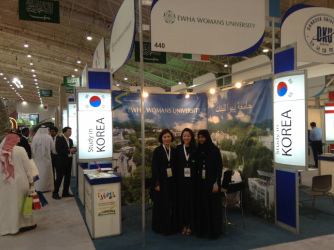 Muscat: Student Lihem, with Ms. Kyuree Lee, Ehwa Muscat: Student Lihem, with Ms. Kyuree Lee, Ehwa A new trend is slowly emerging across the Arabian gulf – and it isn’t just the penguin dance – it’s the educational ties between the Gulf countries and Korea. While international education in Korea was at one time thought of Korean students going to countries such as the U.S., the U.K. or Germany to study (although still popular) – now more and more Korean students are going to learn other languages and cultures. And, other students are coming to Korean universities to further their education. At recent international university fairs in Riyadh and Muscat, the evidence of this new trend was visible in the young people interested in going to Korea to study. Who's Going to Korea to Study?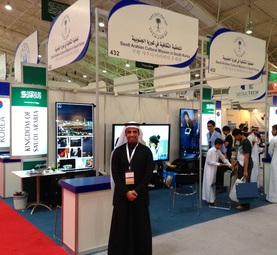 Riyadh: Nabil Abdulaziz, Law Student at Kyunghee Riyadh: Nabil Abdulaziz, Law Student at Kyunghee Nabil Abdulaziz Algarni (Saudi Arabia) Nabil was working at the Riyadh fair for the Saudi Arabian Cultural Mission in Seoul to promote study in Korea. He first became interested in Korea when he became friends with Korean students while studying in London. From there, he decided to further his education in Korea, where he is presently enrolled in the graduate law program at Kyunghee University. In his free time, he assists with the Mission in Korea to help Saudi students adjust to Korea (about 600 Saudi students are in Korea) and advise Korean students who want to study in Saudi Arabia . Like most students adjusting to a new culture, his first few months in Seoul were a bit lonely as he adjusted to the new culture. But, now he is one of Korea's biggest promoters -- he thinks the country is very safe and the people are great. In the future, he would like to work in both Korea and Saudi Arabia and raise his children with an international perspective. 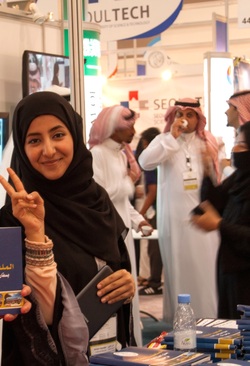 Riyadh: Student Amani Alotaibi Riyadh: Student Amani Alotaibi Amani Alotaibi (Saudi Arabia) Amani became interested in Korea because of her goal in becoming the first female plastic surgeon in Saudi Arabia. To achieve this goal, she researched medical programs worldwide and decided Korea, with its advanced medical practices in plastic surgery, was the place for her. So after researching scholarship opportunities, she decided on the medical program at Dankook University, where she is now a second year medical school student. For Amani, as with Nabil, life in Korea was difficult at first. Since she was the only student wearing a hijab in her classes so it was difficult to make friends with Koreans and other international students. She broke through this wall by initiating conversations and sharing her outgoing, optimistic personality. As she says, now, "Korea is amazing." She travels throughout the country (Geojedo Island - 거제도 is her favorite place) and has many friends. Her advice to anyway thinking about coming to Korea is to "treat Korea like a treasure. Discover it by yourself." It sounds as if she ever decides to change her career from medicine, she could have a bright future with the Korean Ministry of Tourism! 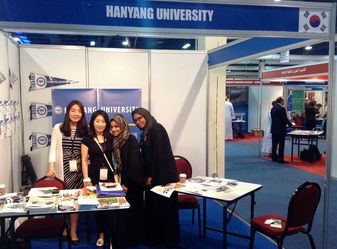 Muscat: Yuni Kang, Jinnie Yoon with with Zahra & Thuwaibah Muscat: Yuni Kang, Jinnie Yoon with with Zahra & Thuwaibah Zahra Abdullah & Thuwaibah Obaid (Oman) Both Zahra and Thuwaibah will be going to Hanyang University Korea in summer, 2014 on a language and culture program. When asked why they wanted to go to Korea, they both mentioned their "addiction" to Korean music and programs and the "green landscape with the wonderful views of mountains and the sea." In the future, both would like to further their education abroad. Who's Promoting Study to Korea? Many Korean universities sent representatives to the fairs in Riyadh and Muscat. Their primary purpose was to promote study in Korea and provide a personal contact for the Gulf students interested in coming to Korea. Jung-Won Jay Chae of Myeongji University is good example. 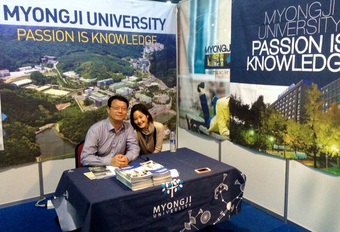 Muscat: Prof. Lee Jong Wha & Jung-Won Jay Chae (on right) Muscat: Prof. Lee Jong Wha & Jung-Won Jay Chae (on right) Jung-Won Jay Chae (at Oman Fair) Jung-Won was part of the adventurous generation of Koreans who left Korea at a young age to study in the U.S. When she was 15 years old, she attended boarding school in the Chicago area and later graduated from Boston College. She returned to Korea, completed a Master's degree, worked for the Ministry of Foreign Affairs, and spent time working for the United Nations in Europe. This international experience led to her present position at Myongji University in Seoul, where she is responsible for sending students abroad to study. Jung-won thinks it is important for her students to learn a different perspective through interaction while they are abroad. Although the U.S. is a prime destinations for many students, she feels that studying in other parts of the workd is just as important. In fact, she has helped 20 Myongji students go the the Middle East and North Africa to learn Arabic. For the future, Jung-won believes that Korean universities will continue to recruit students from other countries. Most of this is due to the changing demographics in Korea as there will continue to be a smaller number of Korean students going to universities. She also thinks it is necessary for the diversity developing in 21st century Korean society as people need to learn other perspectives. FOK Postscript: During one of the FOK Revisits to Korea, Jung-Won was instrumental in assisting with April Herbert (taught English as a Peace Corps Volunteer at Myongji in 1971-72) and Kevin Herbert (taught English at Sungkyun Kwan University 1971-72). What's the Future of International Education in Korea? 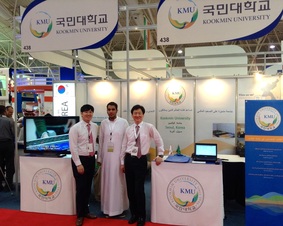 Mr. Song, Mohammad Al Ghamdi & Dr. Jeong Mr. Song, Mohammad Al Ghamdi & Dr. Jeong Mr. Dongsuk Song & Dr. Seung Ryul Jeong (at Riyadh Fair) Dr. Jeong, Vice President for International Affairs and Public Relations, and Mr. Song, Manager of International Recruitment, at Kookmin University (KMU), both gave their views on their experience with International Education in Korea and its future prospects. According to Dr. Jeong, in 1997, when he started teaching at KMU, there weren’t any international students; in 2005, there were about five international students. Now in 2014, 1,700 students from other countries study at KMU, nearly 10% of the total KMU enrollment of 18,000 students. To further emphasize the dramatic change in international education during the last 15 years, Dr. Jeong described a story about one his former graduate students from Pakistan. After graduating from KMU, the student secured a faculty position at a university in Malaysia and continued to stay in contact with Dr. Jeong. Now the two collaborate on joint research and their relationship has changed from teacher-student to peer-peer. Dr. Jeong said there are two factors at work in the growth in international education in Korea. The first is the "push" factor from the Korean government, which wants universities to promote a "pro-Korean" view commensurate with the country's growing economic power and cultural visibility: in short, a top ten economic power needs diversity. The second is the "pull" factor of the individual universities who seek to diversify their campuses for educational and economic reasons. By having a diversified campus and curriculum, universities can improve their rankings in the ultra-competitive Korean education market. Mr. Song adds that with presence of international students on campus, Korean students who cannot study abroad, can still be exposed to diversity on campus (echoes of Ms.Chae above). He feels these contact can open up opportunities: one KMU student who befriended a Finnish exchange student later was offered an unexpected internship in Finland. For the future, both feel that Korean universities will probably aim for a 10-15% international enrollment target for their campuses. These figures will of course depend on international economic and political conditions. Both think that growth may come from the Gulf region as well as from the Commonwealth of Independent States (CIS). However, as a result, the Korean universities will need to adjust to the needs of the changing international demographics on their campuses: the needs of a student from the Gulf may differ from the needs of a student from Kazakhstan. They said that learning these needs as been an ongoing education for the university officials involved in international education. When asked about the views of Korean students towards international volunteer service such as KOICA, both felt that the Korean government needed to better promote these types of initiatives to newly graduated students. They also felt that Korean society and corporations needed to value these types of international experiences more than is presently done. For example, Dr. Jeong felt returned KOICA volunteers would be a perfect fit for companies such as Samsung, which seek to develop regional experts. FOK Postscript 2: Before joining KMU, Mr. Song was employed at the Korean Ministry of Foreign Affairs and worked with FOK past-President, Jon Keeton, to help organize FOK activities in Seoul. What's It Like for Gulf Students to Live and Study in Korea? For many of the Gulf students that I talked to during the fairs, it was apparent that they have a great interest in studying in Korea. Many of them developed this interest through the traditional means: positive contact with Korean students whom they met in a third country or their own country, exposure to Korean culture through media, and career goals that align with Korea's strengths and which can be realized through expanded scholarship programs. Perhaps the best way to see their experience is through the following video: 마지막으로, Thank you! شكرا Thanks to the following Korean university members who shared their views and permitted their pictures to be taken during the fairs in Oman and Saudi Arabia: Dr. Seung Ryul Jeong & Mr. Songsuk Song (Kookmin University); Ms. Jung-Won Chae & Prof. Jong Wha Lee (Myongji University); Mr. Jihoon Jang & Dr. Jungwon Park (Dankook University); Ms. Kyure Lee & XX (Ehwa Womans University); Ms. Yuni Kang & Ms. Jinnie Yoon (Hanyang University); Ms.Christina Bokyung Kim & Ms. Joo Hee Lee (Sookmyung University); Mr. James Sunjae Won (Hallym University); Mr. Young Ha Kwon (Kangwon National University); Mr. Sung Hwan Song (Jeju National University). Thanks to the following students from the Muscat (Oman) & Riyadh (Saudi Arabia) Fairs. Riyadh: Mohammad Al Ghamdi; Nabil Abdulaziz Algarni; Amani Alotaibi. Muscat: Lihem; Simona; Zahra Abdullah, & Thuwaibah Obaid. FOK Postscript 3: At the same time the Muscat education fair was being held, the Korean Embassy in Oman was also hosting a 40th anniversary celebration to commemorate ties between the two countries. Featuring traditional and contemporary Korean music and dance, an evening show titled "Korean Cultural Extravanganza" was well-received by a large Muscat audience and the local press. No doubt some members of the audience were inspired to go and study in Korea in the future! We leave you to enjoy one of the groups that entertained the Muscat audience: 고래야 (Coreyah), a Fusion band performing 하얀 날개... Hallyu in the Gulf region...
4 Comments
Kristin
4/28/2014 09:39:17 am
very creative title!!
Reply
Manuel Franco
6/24/2023 08:58:34 pm
I just want to say Thank You to everyone who supported me through the years. My name is Manuel Franco, New Berlin, Wisconsin. My story of how I won the Powerball lottery of $768.4M is a bit of a tale. I have been playing Powerball tickets for 6 years now since I turned 18. I bought my first ticket on my 18 birthday. I was feeling very lucky that day because I had contacted Dr. Odunga Michael to help me with the winning Powerball numbers. I really had that great great feeling that I looked at the camera wanting to wink at it. I only did a tiny part of it and trusted him. He gave me the numbers after I played a couple other tickets along with it for $10. I checked my ticket after the winnings came online and saw the numbers were correct including the Power play. I screamed for about 10 minutes because it felt like a dream. I had won $768.4M. You can check my winning testimony with the lottery officials just with my name search. Thank you Dr Odunga. Well, his email is [email protected] and you can also call or Whats-app him at +2348167159012 so you guys can contact him
Reply
Leave a Reply. |
Details
Friends of Korea
This is a BLOG for and about Friends of Korea. Archives
May 2019
Categories |
2021 L Street, NW
|

 RSS Feed
RSS Feed

